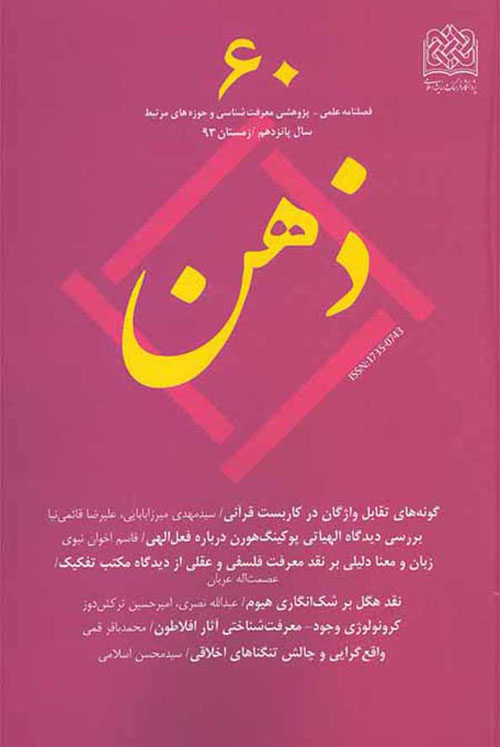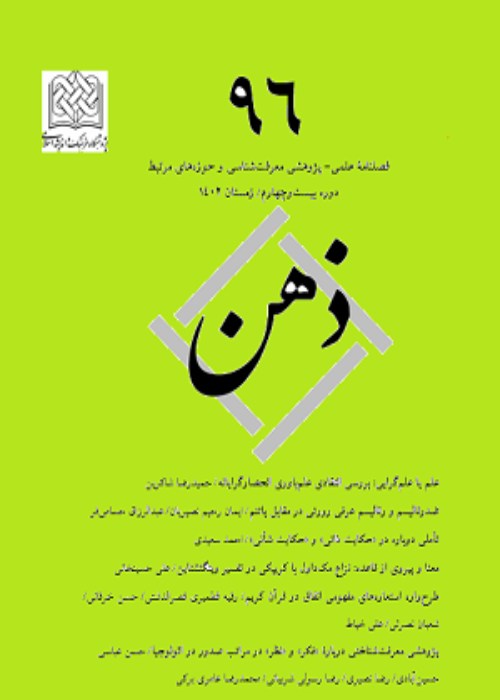فهرست مطالب

فصلنامه ذهن
سال پانزدهم شماره 4 (پیاپی 60، زمستان 1393)
- بهای روی جلد: 60,000ريال
- تاریخ انتشار: 1394/03/24
- تعداد عناوین: 6
-
-
صفحه 65
-
صفحه 129
-
Page 5Some words in addition to are attribute to the noun, they are also able to rating.some times the contrast between two subject is existential which there are the most separation between them. some times word pairs complementary contrast one another and some times there is a symmetrical relation between them.in this contrast one existence achieved in establishment special relationship with another.Some of other words are placed in tow mutual groups as for specific motion path, while other pairs are In such a way that must are arrangement to style circular or serial. Sometimes words just contrast with another by morpheme. and sometimes contrasting between of two pairs occur nor of the words them selves not single words but because of the implied meaning between the two words. in some cases even the contrast is not between tow but it accompanies one group of words but negation of them do not affirm other certain words. These words on one hand can be found in a complete package and consider as whole package, and on the other hand can consider as paired package and for opposite couples.Keywords: Synonymy, Semantic opposition, Logical opposition, The type of semantic opposition
-
Page 29Divine action issue is among the issues discussed in the field of science and theology. The theological views on this issue are more dating. In modern times, according to the views and new approaches in science arose It also considered scientifically and different views on this issue has been raised Each of these views are based on different theological foundations A scientific views about divine actin view is polkinghorn Based on natural theology to explain the issue of God's action The theological principles and assumptions are discussed and criticized his view.Keywords: Divine action, Quantum vacuum, Chaos theory, Natural theology, Intent subject, Possible
-
Page 43Objections to philosophy and philosophical methods by Muslems and nonMuslems have been made in different ways. Objection to theology are more than other parts philosophy. The opposition comes from those who have serious religious concerns. Their concerns are in live with protective religion and its teachings. These people that to purify religion and clear it from pure philosophical reasoning.They are again mixing religion resist to philosophical reasoning. In addition¸ they believe that philosophy and rational reasoning can not help people arrive at God An intellectual current¸ which was rater called the Tafkik School believed in such as orientation. These religious shiete schools disagree to inning and using of logical and philosophical method in circle islamical and humanism sciences. This paper was an attempt to argue that the objections made by the Tafkik School to philosophical reasoning method into religion are language and semantic consideration. They further argue that the referential between the words and their meanings for God is different that by human beings. Our interpretations words are different from their divine meanings.Keywords: Philosophical understanding, Tafkik school, Words, meaning, Semantics
-
Page 65Hegels challenge with scepticism has special characteristics and importance. In Hegel's impretation of history of philosophy, every attitude has a necessary situation and special meaning. Hume's scepticism is not an exception of this universal proposition. In this article, in first step, we explain foundations, meanings and types of scepticism in Humes thought.Then we introduce Hegels criticism. Hegel evaluate Humes scepticism as subjective idealism and as a raw one of it. He rejects this dominant attitude that the only possible approach in rejecting scepticism is foundationalism. Other sections of the article, allocated to introducing Hegels alternative. He looks consciousness as an evolutionary process and by this default, names phenomenology: Passway of Despair. Compairing ancient scepticism and modern one is another part of the article, because the ancient one has been treated as the alternative of Hume's scepticism by some of Hegel's exegetes. Eventually in last section, we will servey the challenge to form coclusion.Keywords: Skepticism, Idealism, Passway of despair, Foudationalism, Epistemological circularity
-
Page 87This papper is going to represent a new arrangement of Platos dialogues based on his ontological as well as epistemological development having essential differences from the current chronologies. While in all of the famous arrangements of the time, Parmenides is regarded as referring to and, thus, later than middle period dialogues, our suggested arrangement assigns somewhere between the early and middle dialogues. Corresponding to this change, not only Meno, Phaedo, Phaedrus and Republic come later than Parmenides but there will be a noticeable distance between Theaetetus and Sophist on the one hand and Phaedo and Republic on the other hand so that Meno and Phaedo are set among the former pair while Sophist and Timaeus among the latter. We will try to show here how this differences can lead to a more consistent reading of the middle and late period dialogues avoiding many problems of other arrangements.Keywords: Platos dialogues, Chronology, Being, Knowledge
-
Page 129Bernard Williams appeals to phenomenology of moral dilemmas to provide arguments against moral cognitivism and realism. In two of his papers, "Ethical Consistency" and "Realism and Consistency" he attempts to show that moral judgments have some features in common with desires and, regarding these features, they are different from purely descriptive assertions. So he argues that (i) there are moral dilemmas that we have no way to put one of the alternative's aside, though realists maintain that we can and have to do so, and (ii) there are moral dilemmas that though we may find support for one of the alternative, yet we experience some kind of regret about the abandoned one, a feeling that is both moral and rational. However, it seems that these objections could be met by having in mind our epistemic limits, using Ross's ethical theory, and providing an externalist desire-based account compatible with a realist outlook. I think that realist can defend his/her position, though can learn from these objections and become a more modest realist.Keywords: Moral dilemmas, Moral realism, Moral emotions, Regret, Bernard Williams


